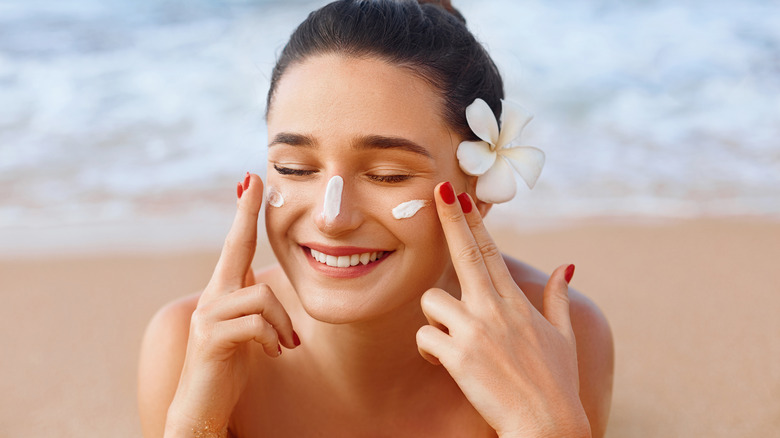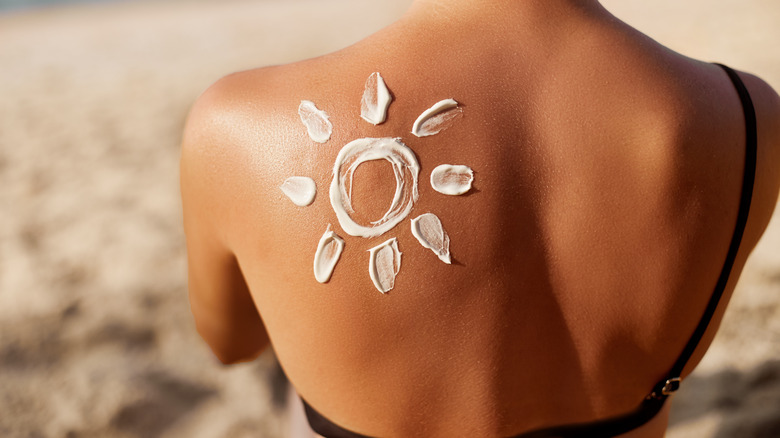Mineral Vs. Chemical Sunscreen: Which Is Better For Acne-Prone Skin?
If you've ever scanned the sunscreen aisle or browsed your favorite online retailer, the never-ending options can feel overwhelming. Add acne-prone skin into the mix, and you can be left scratching your head trying to figure out the difference between mineral and chemical sunscreens. While it may seem like the differences between the two are negligible, they can and can't do very different things.
Sunscreen is a skincare staple that some dermatologists recommend wearing on a daily basis because of how often we come in contact with the sun. It's no wonder, then, that there are so many types to pick from (via the American Academy of Dermatology). Gone are the days of heavy, goopy products. Today's options are more sophisticated and tailored to different skin types and tones (via Harper's Bazaar). Not sure where to start? Understanding the differences will help you determine which SPF is worthy of a spot in your beauty arsenal.
Chemical sunscreens absorb quickly but may contain irritating ingredients
One of the confusing things about picking out a sunscreen can be keeping the terminology straight. Take, for instance, chemical sunscreen. Chemical sunscreens use ingredients like avobenzone and homosalate to absorb the rays of the sun, explains the American Academy of Dermatology. Depending on the active ingredient, they can absorb UVA and UVB radiation, which offers a broad spectrum of coverage.
The downside is that many active ingredients in chemical sunscreens can fail to work after a few hours, offering little protection when under sunlight (via Very Well Health). Many people typically gravitate toward chemical sunscreens because they can be easier to apply and blend into the skin using a spray nozzle, making them water-resistant and perfect for hitting the beach or a dip in the pool (via Good Housekeeping). However, one scientific review article found that sometimes it may absorb too well, resulting in systemic absorption in the body. They also have the potential to cause harm to the environment by leaving chemical traces in our water (via Canadian Medical Association Journal).
The Washington Post explains that particular ingredients like oxybenzone can irritate the skin and may even be linked to hormonal imbalances. For reasons like these, users who have sensitive skin often opt for an effective alternative, like mineral sunscreens.
Mineral sunscreens may leave a white cast but can cause fewer breakouts
Known for its lotion-like consistency, mineral (aka physical) sunscreens have come a long way since the days of uncomfortable, chalky formulas, notes Byrdie. While there are still some products out there that can leave residue behind, today's mineral sunscreens feel like a light veil that can be worn every day. They use powerful ingredients like zinc oxide to protect the skin (via Harper's Bazaar). Unlike chemical sunscreens that can take several minutes before they work, mineral sunscreens offer protection as soon as they're applied and typically won't clog pores, making them ideal for skin that becomes overly reactive in the sun (via Glamour).
In fact, many mineral SPF products are made without oils and fragrances and labeled as non-comedogenic, which means they don't clog pores, decreasing the likelihood of causing breakouts (via Prevention). Another reason that mineral sunscreens can be less irritating to acne-prone skin is thanks to their protective ingredients. In an interview with Piedmont Healthcare, dermatologist Dr. David Harvey explains that mineral sunscreens often contain niacinamide, a type of vitamin B3 that keeps breakouts in check, making them appear less noticeable. With so many varieties out there, even acne-prone skin can reap all of the anti-aging benefits of a daily dose of SPF.


